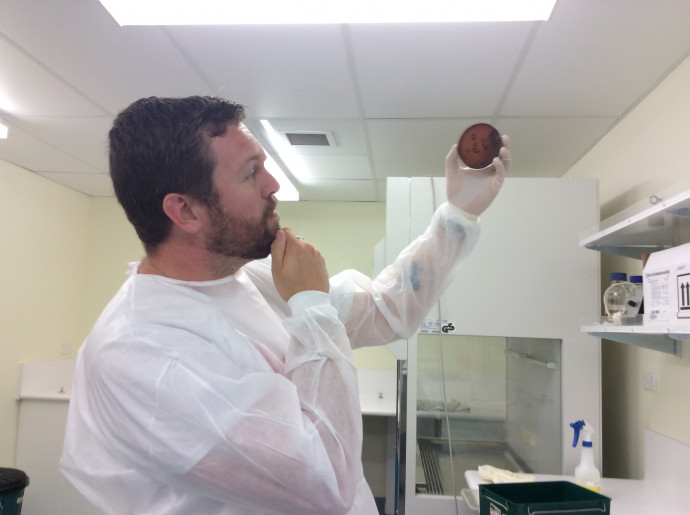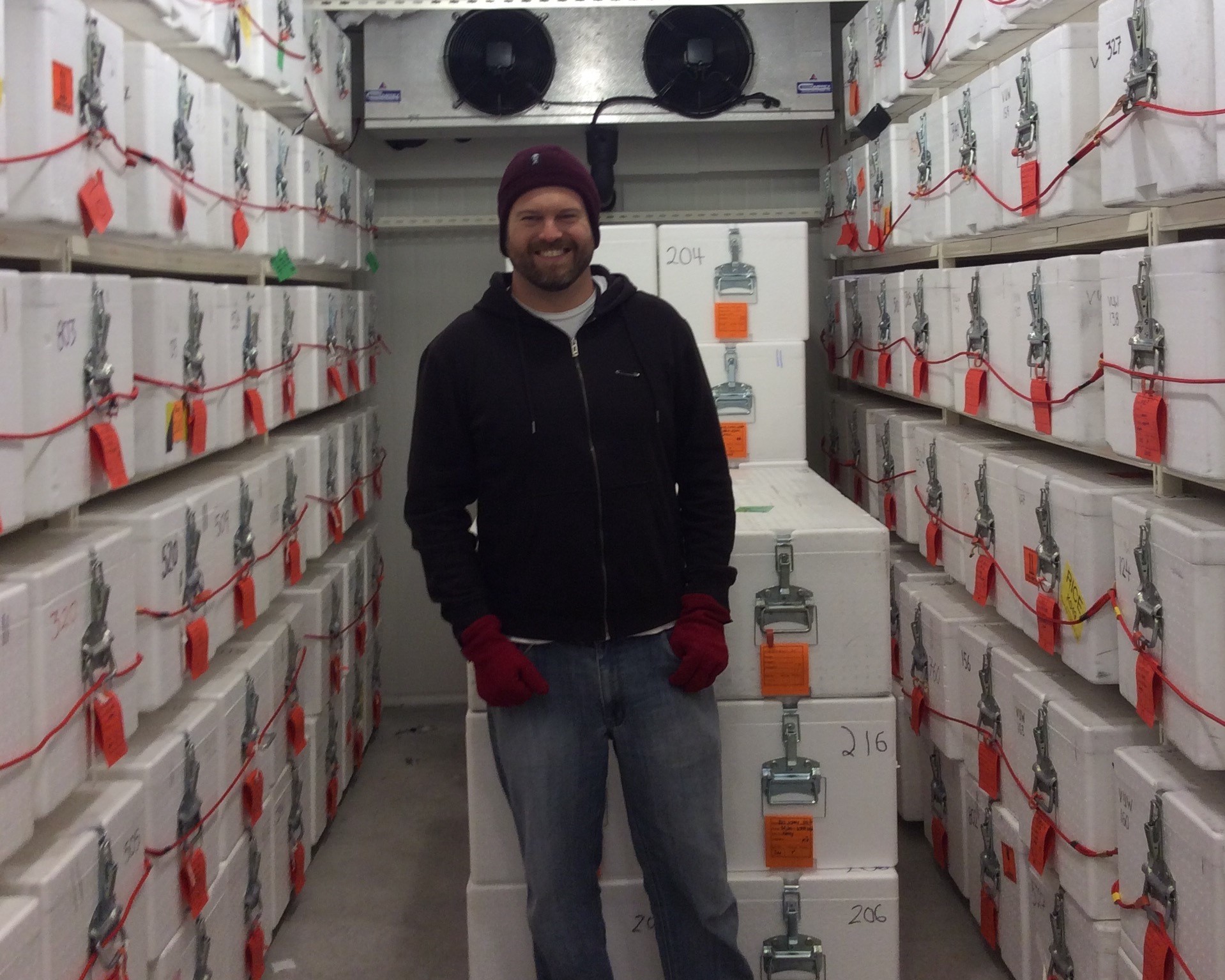News
Published 31 May 2024Q&A: Matt Boucher on his "revolutionary" experience on the Science Teaching Leadership Programme

In this Q&A, we talk with Matt Boucher about his experience on the Science Teaching Leadership Programme in 2017, which he says was “revolutionary” for his development as a teacher and leader.
For phase one of STLP, Matt worked alongside Professor Diane Kenwright and now-former Minister of Health and Minister for COVID-19 Response Ayesha Verall at the University of Otago, Wellington Department of Pathology and Molecular Medicine.
Matt is now a Deputy Principal at Raroa Intermediate School in Johnsonville, Wellington.
Q: Where were you placed for Phase One of your programme and what did you work on?
A: I was in the University of Otago, Wellington Department of Pathology and Molecular Medicine attached to Wellington Hospital. Here I worked directly with Professor Diane Kenwright, who was the head of pathology. We did a lot of work on infectious diseases, they let me play in the lab, grow things in petri dishes, and run things through microscopes. I got talking to the person who ran the electron microscope and managed to grow some bacteria out of my nose on agar plates and put it through the microscope – which the operator hadn’t done before with bacteria. I worked with anatomical pathologists, they would work with organs that had been removed the day before, describing them, cutting them up, and making microscope slides to analyse the samples. I sat in on several meetings of the Infectious Diseases team of the Capital and Coast District Health Board (now Te Whatu Ora Health New Zealand Capital, Coast and Hutt Valley).
Also working in the department at the time was now-former Minister of Health Ayesha Verrall, I worked with her on a project to try to figure out the rate of antibiotic resistance of Staphylococcus aureus – a type of bacteria which in its antibiotic-resistant form can spread in hospitals and cause skin issues and persistent infections. We ran an experiment to see how commonly that came up in students at intermediate schools, I ended up swabbing around 100 students, and going through the process of the ethics committee. The results were inconclusive, but I learnt a lot about how experiments are done.
This was a few years before COVID-19, so when COVID-19 did come up a few years later, I had a good idea of what was going on. It allowed me to get in touch with a few infectious disease pharmacists who were working on antimicrobial resistance week, where they would display posters in hospitals – we teamed up to do a poster competition with school children. The winning student would visit a lab for a day.
Q: What was something eye-opening about being placed here?
A: Being placed with the University of Otago, Wellington Department of Pathology and Molecular Medicine opened a new world for me. I had previously done some teaching in science, I was a high school chemistry teacher and taught earth and space science for a while, but I purposely wanted to do something I wasn’t familiar with – microbiology and anatomy was something I didn’t know much about. I learned so much about how the body works, microbiology, bacteria, and viruses. It was fascinating, and it turned out to be quite relevant a few years down the track.

Q: What was the most beneficial experience of the programme?
A: A couple of things come to mind. One is the focus on skills and looking at science capabilities, which really made a difference in my professional development by seeing scientist’s work. The way that I and many others were taught science, and the way that I defaulted to teaching it, was about science content rather than science skills. Being able to flip the script on that was great – content can come second, it’s about the kids being able to think like scientists, and we can then see what content comes out of that. This has made a real difference to my practice and approach. The leadership aspect of STLP on the leadership development programme at Otago University in Dunedin included talks about how to implement science leadership in school and get others on board. At the time I was in a team leader and senior teacher position, and I think that working through STLP to increase the science teaching and leadership at my school really helped me. It also gave me leadership skills that helped me move on to subsequent positions as a Deputy Principal.
Q: What impact has the programme had on your school?
A: I’ve been at three schools since STLP. At my original school, South Wellington Intermediate School, it really made a difference because we had spent a few years building up the science curriculum from very little to a very structured, well-put-together programme, but it was very content-driven. STLP led us to be able to do a whole revamp, having all the building blocks there from the work we had already done, but turning it on its head to be more skills-based. In doing this, we saw better engagement and better results, it was fantastic. It spun a lot of wheels for a lot of teachers to get involved in that. In my next two schools, my position as a Deputy Principal has allowed me to work alongside teachers and help upskill them in those areas. I’m the go-to guy for helping teachers plan their science teaching, I model lessons, and I’m a good resource for helping teachers figure out how to teach science in the right way and to look at skills-based teaching. I’ve also been able to run a lot of professional development across schools and Kāhui Ako based on my work from STLP. Even though it’s not as direct of an effect as when I was directly in a classroom working with kids, I can influence a bit wider.

Q: Why would you recommend this programme to other teachers?
A: STLP was life-changing for me and changed my outlook on science teaching, but also my love and capacity for it. I get great joy from teaching science now and that all started with STLP. It helped me analyse how to go from a cool idea of the things I’d like to do in class, to making that happen in a school, which is a very deliberate process. It showed me how to take other people alongside me to develop science programmes. In my development as a teacher of science, it was revolutionary. In my development as a leader, it has made all the difference and put me on the trajectory towards leadership. My teaching was re-energised from having this experience of doing something different and putting myself in a place of vulnerability, being a learner, and trying new things.
Q: Is there any advice you’d like to give to new teachers starting the programme?
A: Approach it as a learner and be ready to challenge your assumptions. I feel like I probably started as quite hostile to the idea of throwing away a lot of my well-put-together content-based learning. Be ready to re-think everything, throw yourself in enthusiastically, be vulnerable, and learn new things – the benefit will come from that.
Applications for Term 1 2025 are now open!
The Science Teaching Leadership Programme provides opportunities for primary schools, secondary science departments and their nominated teachers to enhance the teaching of science within school communities.
Learn more about what is involved in the Programme.
